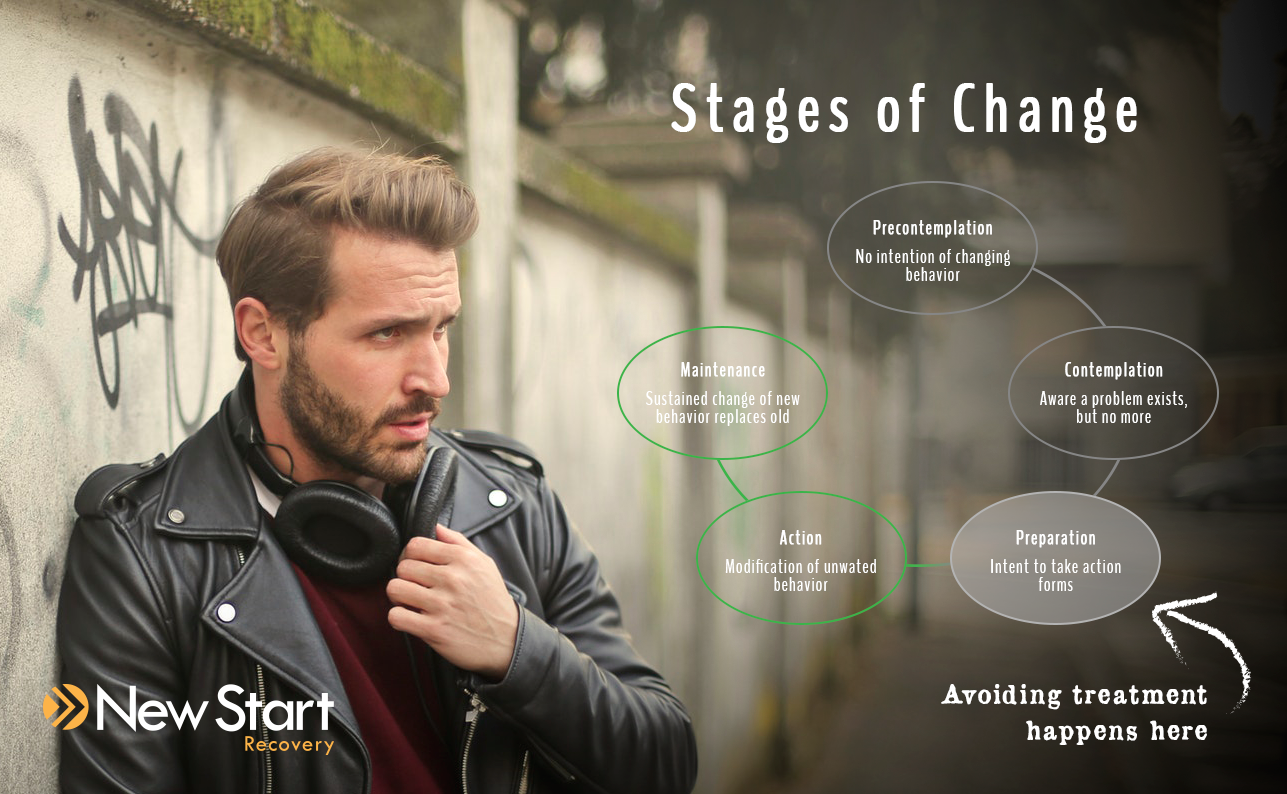We all know the story… and perhaps have acted it out a few times ourselves, too. Some substance habit causes major life problems, yet somehow rehab gets put off over and over. You know you need to get right. You even spoke to a good treatment center. But some tic prevents you from actually admitting into the program. The call of the habit is too strong. It’s gotten to the point where you don’t even get high anymore. Using just maintains your equilibrium, and balancing that habit with your life mounts into an ever-more cumbersome task. But don’t get discouraged! Every person in recovery experienced this avoidance at some point. In addiction psychology, avoiding treatment this way represents a step in the stages of change.

Stages of Change: A Model of Overcoming Addiction
So the model of overcoming addiction has several stages during and after admission, but here we primarily focus on the ones that prevent people from admitting into treatment.
Stage 1
Pre-Contemplation
No intention of changing behavior
The stages of change begin with pre-contemplation, otherwise known as active addiction. It’s the stage where the person is drinking/using and does not acknowledge any real issues with their behavior. Change can only occur if there’s an existing behavior that needs adjustment. At this point, there is no intention to actually progress into stages of change.
Read More: Cognitive Structuring Leads to Addiction
Stage 2
Contemplation
Aware a problem exists, but no more
The ball gets rolling with contemplation. This is usually where addicts begin to suffer consequences of their behaviors. Suddenly, the growing list of cons begins to pit against the comfort of using. An idea of change forms, but it needs some time to percolate.
There is still no action at this stage, but the thought of getting help seems to recur more frequently.
Read More: Pseudo-Exceptionalism: Special Snowflake Syndrome is Deadly for Addicts
Stage 3
Preparation
Intent to take action forms
At this point, the idea of change becomes more of a possibility. It entices the addict more and more, and they are often just waiting for an event or thought to tip the scale into action. Some people start calling treatment centers at this point even though they aren’t necessarily ready to commit.
Unfortunately, the preparation stage often suspends users in limbo. They oscillate between resisting and accepting a major change in lifestyle. As a result, the preparation stage is often steeped in fear. Most people avoiding treatment find themselves in this phase; that is, they have accepted the need for change, but they still need some mental preparation before biting the bullet.
Feelings of guilt threaten to overwhelm many people in the preparation stage. The compulsion to use and the compulsion to get help remain at war. People get caught up on fantasies like the last hurrah or the dread of precipitated withdrawal. Too often, they end up on hotel benders in a bid to avoid treatment. But these are all just pit stops on the way to the most important step along stages of change.
Read More: The Last Hurrah, AKA Lying to Yourself
Stage 4
Action
Modification of unwanted behavior
Sweet, sweet action! This is where procrastinating finally gives way to change. In the action stage of change, good intentions finally blossom into an admission, and addicts enter recovery for real.
Read More: How to Manage Expectations in Recovery
Stage 5
Maintenance
Sustained change of new behavior replaces old
Ideally, most of recovery takes place here. Recovery should result in a successful modification of behavior over a long period of time.
The stages of change demonstrate that avoiding treatment doesn’t mean the end of the world. That said, people can and do overdose in this stage. Even more sabotage their family, relationships, and jobs before actually arriving at action. So lingering in the preparation stage too long does not serve you well.
Some believe that relapse is another stage of change, and that it’s actually an endless cycle. But countless people in recovery demonstrate the falsehood of that belief. Relapse can be part of your story, but it doesn’t have to be. Considering the stages of change without relapse offers a more hopeful approach to recovery.
If you or a loved one is seeking help for a substance abuse problem, our addiction counselors are available 24/7 by phone: 855-737-7363

